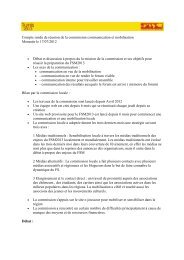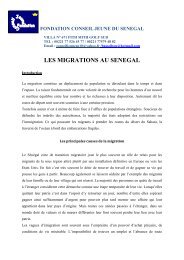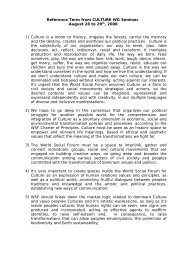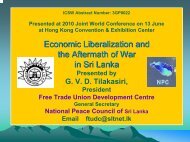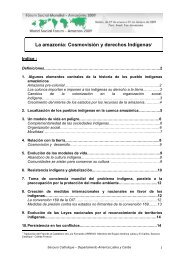Create successful ePaper yourself
Turn your PDF publications into a flip-book with our unique Google optimized e-Paper software.
<strong>Press</strong> <strong>Report</strong> <strong>Europe</strong> <strong>WSF</strong> <strong>2009</strong><br />
The week-long gathering near the mouth of the Amazon river drew up to 100,000 people, including indigenous tribes and<br />
five regional heads of state. All offered a critique of western-led globalisation.<br />
The Ecuadorian president, Rafael Correa, one of a new wave of leftist leaders, said the neo-liberal idealogues in Davos<br />
had failed. "They are the ones responsible for the crisis. They are not the ones to give us lessons."<br />
With Paraguay's bishop-turned-president, Fernando Lugo, Correa led an audience in an ebullient chorus of songs,<br />
including Comandante Che Guevara, a tribute to the Argentinian revolutionary.<br />
Bolivia's Evo Morales, the Andean country's first Aymara president, said social movements must ensure priviliged elites<br />
no longer accumulate capital without considering the human cost.<br />
The Brazilian president, Luiz Inacio Lula da Silva, a moderate leftist, has previously attended Davos but this year<br />
shunned it for Belem and brought with him a dozen cabinet ministers.<br />
His government would invest in industry to create jobs rather than throw public money at banks as <strong>Europe</strong> and the US<br />
had done, he said. "I believe the crisis is much more severe. We don't know how deep it will go."<br />
Latin America still winces at the painful humiliation of the World Bank and International Monetary Fund ordering austerity<br />
measures in the 1980s and 90s. "Now, I expect the IMF to go to [the US president, Barack] Obama and tell him how to<br />
fix the economy," said Lula.<br />
http://www.guardian.co.uk/business/<strong>2009</strong>/jan/30/world-social-forum-latin-america?<br />
keepThis=true&TB_iframe=true&height=650&width=850<br />
‘Green paper gold’ could provide a much-needed fscal stimulus while protecting the planet<br />
from climate change (the guardian)<br />
Brendan Smith, Tim Costello and Jeremy Brecher<br />
The Guardian, 5 February <strong>2009</strong><br />
As the rag-tag army of social movement activists, NGO representatives and other advocates from global civil society<br />
wend their way home from the Amazonian city of Belem, Brazil, and the World Social Forum (<strong>WSF</strong>), they have reason to<br />
believe they have won the debate on globalisation. Global economic catastrophe and global climate catastrophe have<br />
demonstrated to people the world over – including the new president of the United States – that unfettered capitalism is<br />
leading to unfettered disaster.<br />
Yet to many ears, the <strong>WSF</strong>’s rallying cry “Another world is possible” sounds like a hollow slogan. However compelling<br />
their critique, does this motley crew really have anything worthwhile to propose to address the ills of globalisation?<br />
Perhaps. Consider one concrete proposal:<br />
There is growing international support for fighting global economic stagnation and global warming simultaneously with a<br />
“green New Deal”. Investing to cut greenhouse gases can create “green jobs” and provide fiscal stimulus while protecting<br />
the planet. But how is it going to be paid for? The answer: green paper gold.<br />
In 1969, national governments gave the International Monetary Fund (IMF) the right to create Special Drawing Rights<br />
(SDRs), often referred to as “paper gold”. Nobel laureate economist Joseph Stiglitz says that SDRs are “a kind of global<br />
money, issued by the IMF, which countries agree to accept and exchange for dollars or other hard currencies”.<br />
Stiglitz has proposed that paper gold be issued for investment in “global public goods” such as health initiatives and<br />
humanitarian assistance. Today, with trillions of dollars sloshing around the world bailing out the financial sector and<br />
ailing industries, it is time to direct a portion of this money to create “green gold” to help finance a global war on climate<br />
change.<br />
Surely nothing could better qualify as a global public good than saving the planet from ruinous climate change. And at the<br />
same time, this green gold could provide some of the stimulus needed to move the global economy out of its deepening<br />
stagnation. It would help pay for energy conservation, mass transit, research, development and investment in sustainable<br />
energy, technology transfer to low-income countries and climate change adaptation.<br />
57




